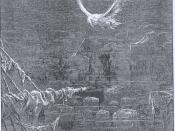In Samuel Taylor Coleridge's poem "The Rime of the Ancient Mariner", the author uses the story of a sailor and his adventures to reveal aspects of life. This tale follows the Mariner and his crew as they travel between the equator and the south pole, and then back to England. The author's use of symbolism lends the work to adults as a complex web of representation, rather than a children's book about a sailor.
First, in the poem, the ship symbolizes the body of man. The ship experiences trials and tribulations just as a real person does. Its carrying the Mariner (symbolizing the individual soul) and crew shows that Coleridge saw the body as a mere vessel of the soul. This symbol of a boat is an especially powerful one, because one steers a ship to an extent, yet its fate lies in the hands of the winds and currents.
Secondly, the albatross symbolizes Christ. Just as the Mariner senselessly slays the bird, man crucifies Christ whose perfection is unchallenged. Even though Christ represents mankind's one chance at achieving Heaven, man continues to persecute Him. The albatross symbolizes the sailors' one chance at deliverance from icy death and the Mariner shoots him.
Thirdly, the South Pole symbolizes Hell. No visible wind blows the unfortunate crew toward the South Pole. Rather, an unseen force pulls them there. Such is the case when the world's temptations lure one to Hell. Just as the sailors approach far to close to this icy purgatory, their Redeemer, the albatross, or at least his spirit, leads them safely back in the right direction.
Fourthly, in the poem England symbolizes Heaven. When the Mariner first sees his country, a great sense of hope and joy overcome him. At the point when the Mariner is about...


